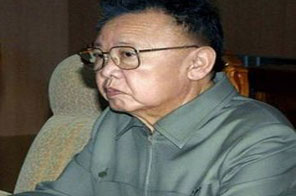NKorea vows to bolster nuclear force as deterrent
SEOUL: North Korea has vowed to bolster its nuclear force unless the United States drops its hostile policy and removes nuclear threats to the North, adding that its nuclear program could not be traded for economic aid.
The reclusive communist nation also designated eight new naval firing zones near its eastern and western sea borders with South Korea in a move that could raise tensions.
North Korea quit the disarmament-for-aid negotiations and conducted a second nuclear test last year, drawing tightened U.N. sanctions. North Korea has demanded a lifting of the sanctions and peace talks formally ending the 1950-53 Korean War before it returns to the negotiating table.
The North's "nuclear deterrent for self-defense will remain as ever and grow more powerful ... as long as the U.S. nuclear threat and hostile policy persist," the North's official Korean Central News Agency said Friday in a dispatch from Pyongyang.
The North's "dismantlement of its nuclear weapons can never happen ... unless the hostile policy towards the (North) is rolled back and the nuclear threat to it removed."
The North claims it was compelled to develop atomic bombs to cope with U.S. nuclear threats. The U.S., which denies making any such threats against the North, has called on the North to return to the disarmament talks that also involve South Korea, Russia and Japan.
KCNA's comments came amid diplomatic efforts to jump-start stalled disarmament talks.
North Korean envoy Kim Kye Gwan plans to attend a seminar in San Francisco before heading to New York to meet with Washington's lead nuclear negotiator Sung Kim either late this month or next month, the South Korean cable news network YTN reported Friday, citing an unidentified source in Beijing.
Kim was in Beijing earlier this month for talks with his Chinese counterpart on resuming the nuclear talks, and his aide met with U.S. Embassy officials in Beijing to coordinate Kim's trip to the U.S., YTN reported.
In Washington, State Department spokesman P.J. Crowley on Friday denied the report and reiterated that the U.S. has no current plans to meet with North Koreans officials.
"There are no plans right now for North Korean officials to come to the United States, nor for U.S. officials to meet with them," Crowley told reporters.
Officials from the U.S. and North Korea last met one-on-one in December, when President Barack Obama's special envoy on North Korea, Stephen Bosworth, visited Pyongyang. The bilateral talks were the first since Obama took office.
The newly designated "naval firing zones" are effective Saturday through Monday, Seoul's Joint Chiefs of Staff said Friday. The JCS, however, said there was no immediate signs of particular movement of North Korean troops.
Last month, North Korea fired artillery shells near its disputed western sea border, prompting the South Koreans to fire warning shots. No injuries or damage were reported.
The North has since deployed dozens of multiple rocket launchers in major bases along its west coast, Yonhap news agency reported, citing a Defense Ministry report submitted to the legislature.
The Defense Ministry said it could not immediately confirm the report.
Despite the North's move, South Korea said it will deliver anti-flu hand sanitizers worth 1 billion won (US$861,000) to the North on Tuesday, according to the Unification Ministry.
South Korea already sent swine flu medicine to the North in December after North Korea acknowledged an outbreak of the disease.






